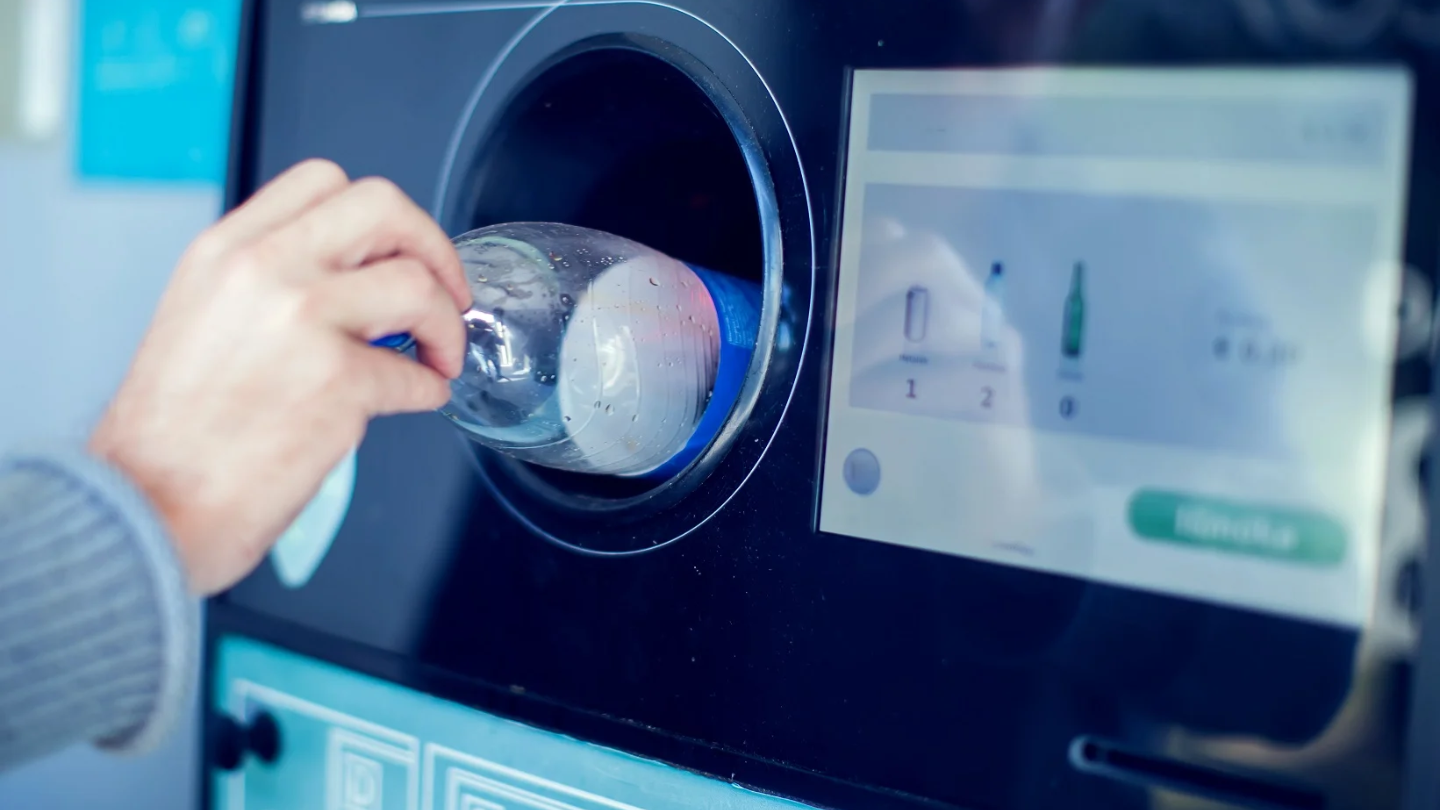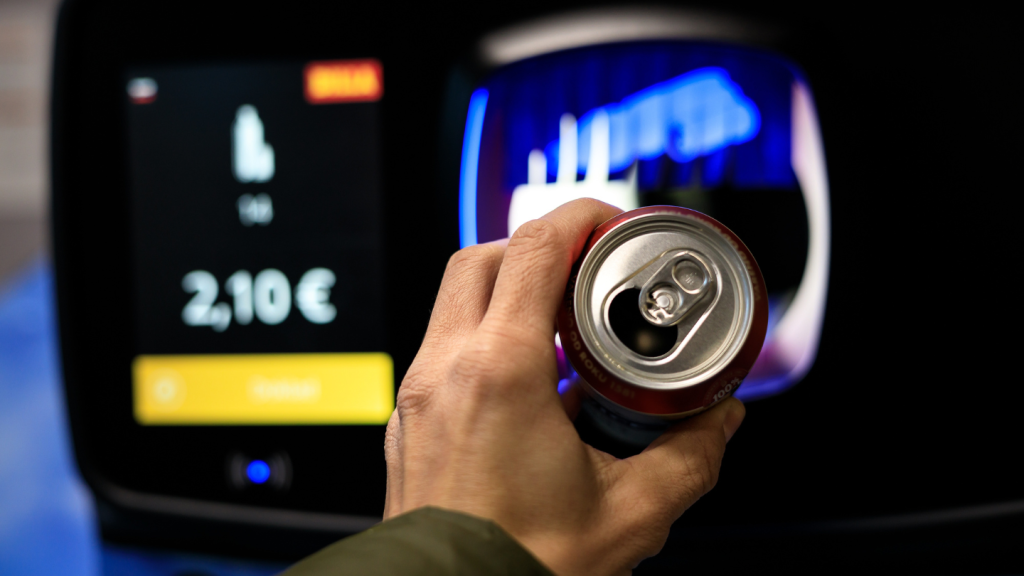
The UK government first announced plans for a Deposit Return Scheme (DRS) back in 2018 with the aim of increasing recycling rates and cutting down on plastic waste.
This week, it announced the scheme has been further delayed to October 2027 as a single rollout, nine years after originally promised by then-Environment Secretary Michael Gove.
The industry reaction has generally been positive concerning the new date but other environmentally focused associations have expressed their concerns.
The Marine Conservation Society’s CEO Sandy Luk labelled it a “huge disappointment” that the UK will have to wait another three years for DRS implementation.
“For our ocean’s sake, we can’t keep kicking the can – or bottle – down the road,” she said.
Why the pushback?
A DRS is a system in which consumers pay a small fee when purchasing certain types of containers, such as bottles or cans. The fee is refunded to them when they return the container to a designated collection point. The goal the scheme is to encourage recycling and reduce litter.
More than 50 countries operate a DRS with “huge levels of success”, according to the Marine Conservation Society.
In Germany, the DRS has achieved return rates of 98%, with every shop required to take bottles back, according to recycling nonprofit Reloop’s data. Similarly, in Finland, reportedly 93% of bottles and cans purchased were returned through its DRS.
For the UK, the aim of the scheme is to reduce the estimated 14 billion plastic drinks bottles and nine billion drinks cans that are used in the country every year. It could reduce the number of containers that end up in landfill by 85%.
The UK’s DRS was originally meant to launch in August 2023 (with Scotland’s individual plans pushed back from 2022 due to Covid-19), before being pushed back to 2024, then 2025, and now 2027. Delays have mainly been caused by disagreement over which materials should be included in the scheme.
The scheme will apply to PET plastic, steel and aluminium drinks containers in England, Northern Ireland, Scotland and Wales. The main area of contention in the latest announcement is that glass containers will be excluded, except for in Wales.
Glass issues
Glass bottles were pulled from the pending DRS plans in England and Northern Ireland back in 2022, while Wales and Scotland both chose to include it.
The absence of consistency was scrutinised then and continued to prove a problem when last June the UK government approved the launch of Scotland’s DRS, with the caveat glass be temporarily excluded.

The Internal Markets Act approved an exemption to allow Scotland’s DRS to move forward but added glass returns could not be part of the scheme until England, Wales and Northern Ireland had their own DRS systems in place.
Lorna Slater, now ex-minister for circular economy in Scotland, said: “It is clear that the scope and form of the scheme that this parliament passed cannot go ahead as currently planned.”
Shortly after, Scotland’s DRS was delayed until 2025 in favour of the incoming UK-wide programme. Circularity Scotland – the company in charge of the DRS implementation – entered administration later that month.
However, Wales has since stuck to its plan to include glass in its scheme.
Will Wales see a similar fate to Scotland?
The Welsh government defended its position on glass, saying Wales’s “baseline and landscape is different to our UK counterparts”.
In a statement, Huw Irranca-Davies MS, Cabinet Secretary for climate change and rural affairs, said: “The evidence on glass is clear. With over 50 successful international examples of DRSs where the overwhelming majority include glass as standard.
“Not only should Wales not have to settle for less than the international best practice standard, but it is essential if we are to continue to make progress against our baseline and ensure the scheme will be effective in supporting the transition to net zero.”
However, other trade associations are urging the Welsh government to reconsider its stance, arguing it will create trade barriers.
The Society of Independent Brewers and Associates (SIBA) chairperson Richard Naisby called out the “political failure” of the UK government to implement one scheme across all of the UK.
“While much progress has been made across the four nations to align the schemes including a de minimis for low volume products, today’s announcement means that small businesses in Wales will be penalised by the political failure to agree the same materials, with Wales the only nation to include glass,” he said.
Similarly, a joint statement from the British Soft Drinks Association and Natural Source Waters Association outlined: “A unified and consistent scheme is critical and it’s disappointing that the Welsh government continues to be an outlier in calling for the inclusion of glass within scope.”
However, the Marine Conservation Society said it was “extremely disappointed that glass is still not included in the ambition for England, Northern Ireland and now Scotland too.”
It said: “We applaud the Welsh Government for keeping their commitment to glass and we want to see every other country follow their lead and put glass back on the table.”
What happens next?
Suppose we are to learn anything from Scotland’s DRS failure. In that case, it is that collaborative work will be required to make the new 2027 date function and it should have consistency in materials processed, as several trade bodies have said.
Food and Drink Federation CEO Karen Betts said: “It’s critical that the UK’s governments now work closely together to ensure the scheme is easy to use and understand, operating under the same rules and with the same labels across the four nations.”
After Wales revealed its glass plans, Environment Secretary Steve Barclay said the UK government would decline a request from the Welsh government for full exclusion from the Internal Market Act, similarly to the outcome with Scotland last summer.
Irranca-Davies wrote: “The misuse of the Internal Market Act as a means to restrict devolution is not about the market – as evidenced by the UK government’s refusal to reexamine its decision to diverge from what was the common position.
“Our objection to the act lies in the fact that it is open to abuse as it places all the power with the UK government and goes far beyond the structures needed to ensure economic and regulatory cooperation between the nations of the UK.”
A confirmed new date for a DRS to become operational is ultimately good news for the UK as a whole, despite it being further away than first anticipated.
However, the Welsh government should not be expecting smooth sailing for the next three years regarding its glass inclusion, and maybe it has something to learn from Scotland’s experience.




